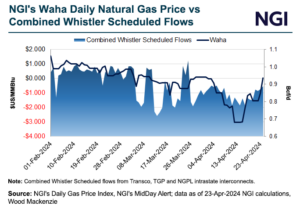Regulatory | E&P | Infrastructure | NGI All News Access
Argentina Bets on Natural Gas in Hydrocarbons Bill as Vaca Muerta Comes to Life
© 2024 Natural Gas Intelligence. All rights reserved.
ISSN © 2577-9877 | ISSN © 2158-8023 |

Markets
Natural gas futures finished higher Tuesday after a choppy session that began in the red, supported by a rebound in U.S. LNG exports and a blitz of pipeline maintenance that sent gas production estimates lower. At A Glance: West Texas prices flip positive MVP pipeline ready to start in May Production falls below 97 Bcf/d…
April 23, 2024By submitting my information, I agree to the Privacy Policy, Terms of Service and to receive offers and promotions from NGI.